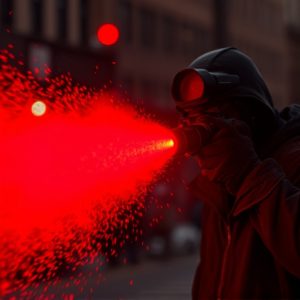Deciphering Pepper Spray’s Potency: Vision Impact, Body Effects, and Legal Use Precautions
Pepper spray, containing oleoresin capsicum (OC), is a non-lethal self-defense agent that temporari…….
Pepper spray, containing oleoresin capsicum (OC), is a non-lethal self-defense agent that temporarily incapacitates by causing intense irritation to the eyes, skin, and respiratory system. The active ingredient, capsaicin, induces a strong inflammatory response leading to severe pain, vision impairment, coughing, difficulty breathing, and panic without causing permanent blindness. Upon contact with pepper spray, individuals experience immediate and intense irritation, with the eyes particularly affected. This results in an overwhelming release of tears, significant blurring of vision, and eyelid swelling due to interaction with sensory neurons and the trigeminal nerve response. The effects are temporary, but they can be extremely debilitating, making it feel like one is 'blinded.' Recovery typically occurs within 15 to 45 minutes, though skin sensitivity and respiratory issues may persist longer. It's important for users to understand the legal status of pepper spray in their area, adhere to safety protocols, and recognize its potency in impairing vision. Proper training is essential to use it effectively and safely. Can pepper spray blind you? While it can temporarily 'blind' by causing severe eye irritation, permanent blindness is rare. Users should be well-informed about the long-lasting effects, including potential skin rashes, prolonged eye pain, and respiratory difficulties, to use pepper spray responsibly in self-defense or law enforcement contexts.
When considering personal safety devices, pepper spray emerges as a potent tool widely used for self-defense. Its effects, while temporarily disabling an attacker, can be profound and are not to be taken lightly when it comes to both immediate and long-term consequences. This article delves into the chemistry of pepper spray, its mechanism of action, and the potential impact it has on the human body, addressing the question: Can pepper spray blind you? We will explore the immediate effects on vision, the body’s response over time, and the legal framework surrounding its use, ensuring readers are well-informed about this self-defense solution.
Understanding Pepper Spray: Its Composition and Mechanism
Pepper spray is a non-lethal self-defense tool that contains oleoresin capsicum (OC), a compound derived from hot peppers. The primary effect of pepper spray, often referred to as OC spray, is to temporarily impair an assailant’s vision and ability to normally function by causing irritation to the eyes, skin, and respiratory system. Upon deployment, the active ingredients in pepper spray create a powerful inflammatory response, leading to intense pain and discomfort that can effectively incapacitate an attacker. The effects are not limited to the sensory organs; they also include coughing, difficulty in breathing, and a general sense of panic due to the extreme irritation caused by the spray.
Can pepper spray blind you? While it does not cause permanent blindness, the intensity of its effects can temporarily blind an individual. The spray’s concentrated concentration of capsaicin, the active component responsible for the “heat” in chili peppers, can rapidly inflame the mucous membranes in the eyes, causing a reflexive closing of the lids and extreme pain that may prevent the individual from seeing for several minutes. The impact on vision is not due to damage to the eyes themselves but rather to the overwhelming sensation that makes it impossible for the person to keep their eyes open or to see through the tears and mucus produced in response to the spray. Understanding the composition and mechanism of action of pepper spray is crucial for effectively utilizing it as a safety tool while also recognizing its limitations and potential effects on an individual during an encounter.
The Immediate Impact of Pepper Spray Exposure on Vision
When an individual is subjected to pepper spray, one of the most immediate and pronounced effects is its impact on vision. Pepper spray, also known as oleoresin capsicum (OCC), contains a concentrated extract of chili peppers that can cause severe irritation upon contact with the eyes. The active components in pepper spray, primarily capsaicinoids, interact with sensory neurons in the eyes, triggering an overwhelming response from the trigeminal nerves that control sensation in the face. This interaction rapidly leads to a burning sensation, intense pain, and swelling of the eyelids, making it difficult for the affected person to keep their eyes open. The eyes may produce copious amounts of tears as they attempt to flush out the irritant, further exacerbating the visibility issues. Within seconds to minutes, the victim’s vision becomes blurred, significantly impairing their ability to see clearly. The intense pain can make it impossible for the person to focus on any objects, effectively reducing visual acuity to near zero in extreme cases. It is a common question whether pepper spray can cause temporary blindness or permanent damage; while it does not typically lead to lasting vision loss, the immediate effects can be so overwhelming that it may feel as though one has been ‘blinded’ by the spray. The intensity of the impact on vision is contingent upon factors such as proximity to the spray and the duration of exposure. It is crucial for individuals in law enforcement or self-defense situations to understand that while pepper spray is non-lethal and deemed a less-than-lethal munition, its effects on vision are immediate and can be debilitating, necessitating careful handling and use.
Long-Term Effects of Pepper Spray on the Body
Exposure to pepper spray, also known as oleoresin capsicum (OC) spray, can have immediate and short-term effects on individuals, such as intense burning in the eyes, skin, and respiratory tract. While the acute impact of pepper spray is well-documented, understanding its long-term effects is crucial for assessing its use in self-defense or law enforcement. Prolonged exposure or repeated use of pepper spray may lead to more persistent issues. The eyes, for instance, can experience prolonged pain and irritation that lasts beyond the initial encounter with the spray. Vision may be impaired temporarily, raising the question of whether pepper spray can permanently blind someone. However, complete and permanent loss of sight from pepper spray is rare; most individuals regain their vision within 15 to 45 minutes after exposure, given proper treatment and hydration. The skin’s sensitivity to capsaicin, the active component in pepper spray, can also persist for an extended period, potentially causing a rash or skin discoloration that may last several days. Long-term effects on the respiratory system might include persistent coughing and difficulty breathing, which can be exacerbated if the individual continues to expose themselves to irritants. It is important to note that the severity of long-term effects can vary based on factors such as the concentration of the spray, the duration of exposure, individual sensitivity, and underlying health conditions. Therefore, while the immediate effects of pepper spray are often manageable with appropriate care, its potential to cause long-lasting discomfort should be considered when evaluating its use in various situations.
Legal Considerations and Safety Precautions When Using Pepper Spray
When considering the use of pepper spray for self-defense, it’s crucial to understand its legal framework and safety implications. Pepper spray is a non-lethal self-defense tool that can temporarily incapacitate an attacker by causing intense irritation to their eyes and respiratory system. Its legality varies by jurisdiction; therefore, it’s imperative to verify state or local laws before purchasing or using pepper spray. In some regions, there are specific restrictions on the type of pepper spray one can possess, such as the concentration of the active ingredient, oleoresin capsicum (OC), and the quantity allowed.
Safety precautions are equally important when deploying pepper spray. While it is designed to affect an assailant, there is a risk of accidental exposure to bystanders or oneself. It’s essential to practice using the spray in a controlled environment to familiarize oneself with its effects and understand how wind and environmental conditions can affect its trajectory. Direct exposure to pepper spray can cause severe eye pain, difficulty breathing, coughing, and skin redness—potentially leading to temporary blindness if not properly rinsed from the eyes. To mitigate these risks, always follow manufacturer guidelines, use protective gear during practice, and consider taking self-defense training that includes proper usage of pepper spray. Additionally, ensure that you are at a safe distance from the target and have an escape route identified to avoid prolonged exposure or engagement in conflict beyond what is necessary for self-defense.


